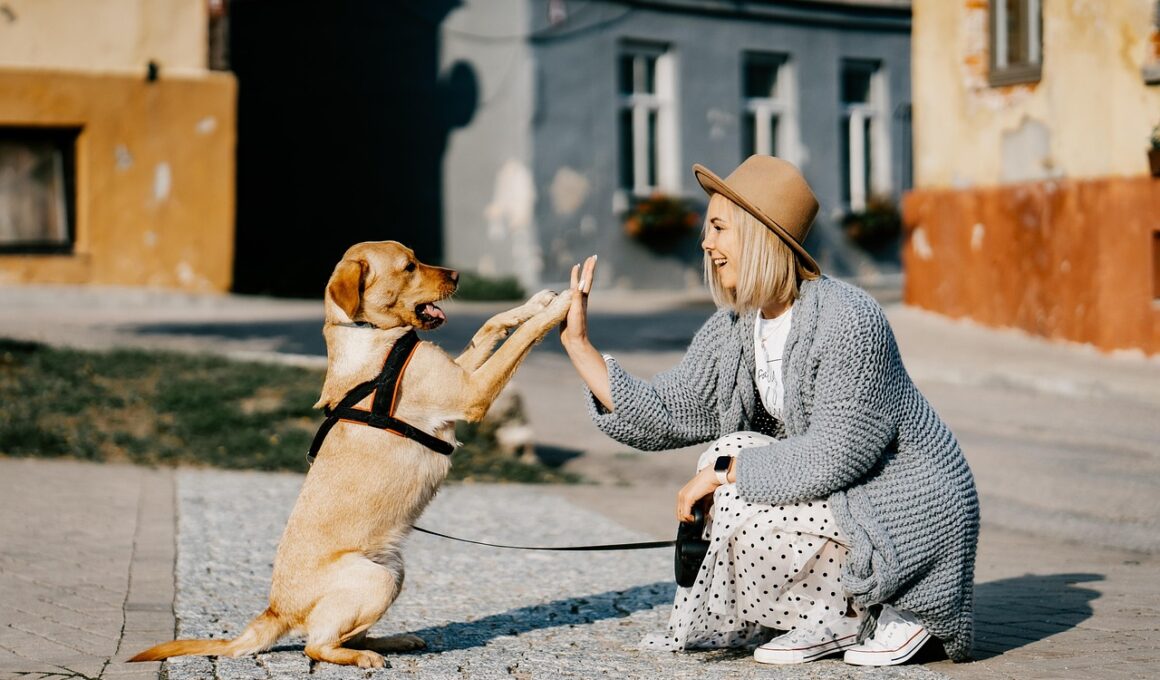Signs of Successful Socialization in Your Dog
Socialization is an essential process for your dog’s development, helping them become well-adjusted and behaved companions. One of the most significant signs of successful socialization is the dog’s comfort in the presence of other dogs. A well-socialized dog will show calmness and an inquisitive nature. This indicates they are accepting of various dog breeds and sizes. Like humans, dogs can experience anxiety around new friends. A dog that exhibits curiosity rather than fear is a solid indicator. Additionally, dogs that demonstrate playful behavior with their peers reveal a friendly demeanor. Other signs include tail wagging and relaxed body language. Moreover, a well-socialized dog learns to communicate effectively. You’ll notice them using a mix of barking, growling, and body language to express themselves. Observing these behaviors shows that they feel secure. A dog that is adaptable to different environments also signifies good socialization. They must remain relaxed during outings in public places, like parks. Overall, the ability to switch easily between calm and playful demonstrates a well-rounded dog. Making introductions with other animals while maintaining your dog’s comfort level is vital for success. Dive deeper into observing these essential traits.
Another significant sign of successful socialization lies in your dog’s interactions with people. A well-socialized dog will greet newcomers without excessive barking or aggression. Instead, they are likely to show interest and curiosity, sniffing and wagging their tail. This behavior displays confidence, indicating that they are comfortable around humans. It’s also essential to examine your dog’s response to different age groups. A dog that is friendly towards children and calm around elderly individuals is likely well-adjusted. Moreover, observing how they respond to unfamiliar sounds or situations can reveal their comfort level. A confident dog would remain calm when faced with noisy environments or unfamiliar sights instead of retreating or displaying fear. Another key behavior is the dog’s ability to read the emotions of others. Well-socialized dogs often respond positively to their owner’s moods, offering affection when needed. Likewise, if your dog shows signs of stress around other people, it may indicate a need for further socialization. Regularly exposing your dog to diverse situations and people can enhance their adaptability. Positive reinforcement during these interactions reinforces their learning and helps develop their confidence.
Play Behavior and Social Skills
Play behavior is a crucial aspect when it comes to identifying a well-socialized dog. Observing how your dog plays with other canines reveals much about their social skills. Dogs that enjoy interactive play displays confidence and well-being. Their willingness to share toys or even engage in chasing games indicates healthy social behavior. On the contrary, a dog that is overly aggressive during play or remains isolated often suggests inadequate socialization experiences. Additionally, dogs who take turns during playtime demonstrate important social skills. Sharing is a critical character trait that reflects a dog’s understanding of companionship. Listen for playful barks and body movement. A well-adjusted dog usually plays energetically without losing control. Furthermore, the ability to follow cues from their playmates reflects that they are mindful of their surroundings and adjusting their behavior accordingly. Consider engaging your dog in various types of play to encourage this skill development. Regularly exposing your pet to different play scenarios and dog-friendly environments reinforces their positive social behavior. Interaction with different dog breeds may also enhance their social adaptability. Pay attention to the nuances in their interactions to gauge their social skills effectively.
Body language can offer profound insights into your dog’s socialization skills. A well-socialized dog exhibits relaxed body posture, ears in a neutral position, and a wagging tail. Understanding these cues can significantly enhance your dog’s social experience. On the contrary, signs of tension like a tucked tail or stiff body might indicate discomfort or poor socialization. Observing your dog while interacting with others can provide essential information about their comfort level. Dogs demonstrating trust in their surroundings often become more sociable. Moreover, consider how your dog behaves on a leash. A well-socialized dog should walk calmly beside you, instead of lunging towards other dogs or distractions. This behavior shows their ability to remain focused and self-regulated. It’s essential for you, as the owner, to be attentive to your dog’s cues and stresses. If your dog appears anxious, offering reassurance and promoting confidence is crucial. Training sessions involving various distractions can be beneficial in building their self-assurance. Consistency during these exercises reinforces their learning, contributing to a more relaxed, social dog. As you observe these signs, continual socialization remains necessary for maintaining these positive behaviors.
Adaptability and Confidence
Adaptability is another defining trait of a well-socialized dog. Ideally, your dog should be able to navigate new environments confidently. Whether it’s visiting a bustling market or a quiet family gathering, adaptability reflects their comfort level. Look for signs of curiosity instead of fear during these experiences. A well-socialized dog will show interest in the surroundings, showcasing confidence as they explore. This exploratory behavior indicates exposure to a variety of environments. When dealing with new experiences, your dog should remain calm while responsive. This responsiveness highlights security and adaptability. Furthermore, watching how your dog interacts with new people is essential. They should approach strangers with friendly curiosity, capturing new opportunities for interaction. Observing your dog’s ability to settle down after an exciting event reveals their adaptability as well. A confident dog knows when to relax, allowing them to enjoy a variety of experiences. Continual exposure, positive reinforcement, and patience are critical in developing this skill. As you work with your dog, their growing confidence will enrich their life experiences, forming a more balanced animal that thrives on social interaction.
Positive reinforcement plays a vital role in fostering successful socialization in your dog. Encouraging good behavior through treats or praise enhances their ability to interact with others comfortably. When they receive positive feedback during friendly encounters, they begin to associate social situations with positive experiences. This association reinforces their willingness to engage with other dogs and strangers. Additionally, timing is pivotal in effective reinforcement. Ensure you reward desired behavior immediately to strengthen the association. Incorporating training sessions that involve socialization can elevate the effectiveness of these encounters. Gradually exposing your dog to diverse situations ensures their confidence grows over time. Engaging them in activities such as group classes enhances social skills while promoting positive interactions with other dogs. It’s essential to celebrate small victories during the socialization process. As your dog gradually adapts to new environments, acknowledging such progress boosts their sense of achievement. Similarly, you must avoid negative reinforcement methods, as they lead to fear-based behaviors. Prioritize positivity during training to cultivate trust and loyalty. By focusing on this strategy, you will likely build a mutually enjoyable relationship with your dog through successful interactions.
Conclusion
In conclusion, recognizing the signs of successful socialization in your dog is crucial for ensuring their well-being and happiness. The various traits discussed, such as adaptability, confidence, and effective communication, are integral to a well-adjusted pet. Each interaction with other dogs and people provides an opportunity for growth and development. Observing body language and play behavior can reveal much about their social skills. Additionally, incorporating systematic exposure to diverse environments fosters healthy traits over time. Socialization is not a one-time event; it is a lifelong process that requires ongoing effort. Owners must regularly engage their dogs in new experiences, ensuring continual improvement in their social interactions. Positive reinforcement techniques during training help foster these needed skills while enhancing the bond between dog and owner. Your commitment to their socialization journey will have lasting effects on their overall happiness and attitude toward life. Each step taken to promote confidence and adaptability will yield positive outcomes. As you nurture these characteristics, you create a more harmonious daily life together. Witnessing your dog thrive in social situations is one of the most rewarding experiences as a dog owner.
Through consistent effort and time, your dog will flourish into a well-socialized companion, full of life and enthusiasm, delighting in their interactions with others.


